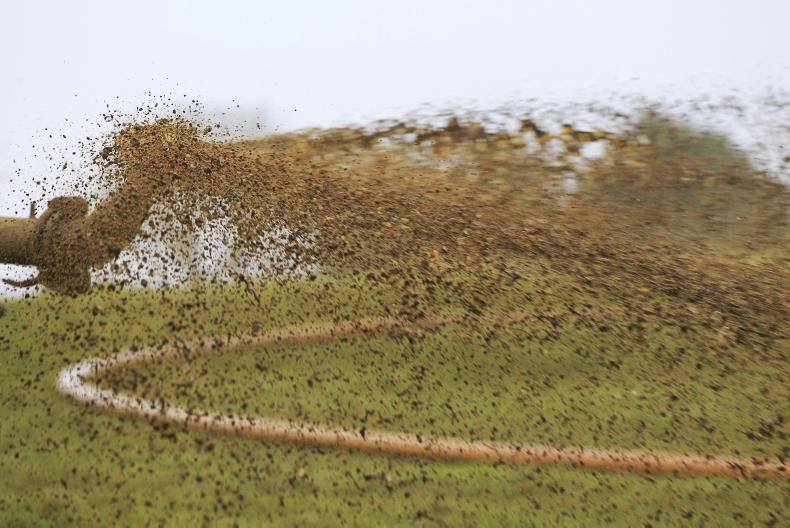The European Court of Justice has found Germany in breach of the nitrates directive, including on the dates of closed periods and the volumes of nitrogen allowed.
In a ruling last week, the court found that "by not adopting additional measures or reinforced actions as soon as it appeared that measures of the German nitrates action programme was insufficient and not revising that programme, the Federal Republic of Germany was in breach of its obligations" under the nitrates directive from 2012.
The court ruled in favour of the European Commission on all points it raised in its legal action in 2014, after giving Germany a deadline to fix breaches of the directive. Denmark supported the German case. Germany later upgraded its nitrates regulations.
More specifically, the court rejected Germany's argument that it was still evaluating the efficiency of its existing measures before making changes when legal action started in 2014. If countries were allowed to wait until they're certain their nitrates regulations are perfect or need improving, they could delay decisions indefinitely, the ruling argued.
Although Germany lost its nitrates derogation at the end of 2013, its internal legislation was still allowing farmers to spread 230kg N/ha instead of the maximum 170kg N/ha. Germany argued that this possibility de facto ended when its derogation dropped, but the court replied that all EU member states must ensure that their legislation transposing the nitrates directive is "clear and precise". Germany also argued that up to 60kg N/ha was not available to plant and should be discounted, but the court ruled that there was no scientific evidence for this.
Spreading dates
The court found that Germany's exemption of farmyard manure from closed periods was illegal. The ruling also rejected Germany's claim that it would be too complicated to introduce different dates for parts of the country with different soils and climates. Germany applied closed periods of 1 November to 31 January for tillage land and 15 November to 31 January for grassland at the time. The court agreed with the Commission that "those periods are too short and should have been different depending on soil and climate regions or environmental factors".
Germany cited studies on closed periods including from Ireland, but the court found that the Irish study referenced applied solely on the choice of the best date for grass fertilisation in the spring and not the efficiency of closed periods.
The court also found that Germany was in breach of the nitrates directive when it comes to spreading restrictions on slopes, minimum farm effluent storage requirements and spreading on frozen or snowy ground.
The court did not examine whether the current German nitrates regulations, which were last updated in 2017, comply with the directive.
Read more
How UK farmers are responding to water quality challenges
€1.6m spent annually evaluating the effect of the nitrates directive
Flexible approach needed at farm level on nitrates – EU report
Water quality ‘first thing that’s looked at in nitrates review’
The European Court of Justice has found Germany in breach of the nitrates directive, including on the dates of closed periods and the volumes of nitrogen allowed.
In a ruling last week, the court found that "by not adopting additional measures or reinforced actions as soon as it appeared that measures of the German nitrates action programme was insufficient and not revising that programme, the Federal Republic of Germany was in breach of its obligations" under the nitrates directive from 2012.
The court ruled in favour of the European Commission on all points it raised in its legal action in 2014, after giving Germany a deadline to fix breaches of the directive. Denmark supported the German case. Germany later upgraded its nitrates regulations.
More specifically, the court rejected Germany's argument that it was still evaluating the efficiency of its existing measures before making changes when legal action started in 2014. If countries were allowed to wait until they're certain their nitrates regulations are perfect or need improving, they could delay decisions indefinitely, the ruling argued.
Although Germany lost its nitrates derogation at the end of 2013, its internal legislation was still allowing farmers to spread 230kg N/ha instead of the maximum 170kg N/ha. Germany argued that this possibility de facto ended when its derogation dropped, but the court replied that all EU member states must ensure that their legislation transposing the nitrates directive is "clear and precise". Germany also argued that up to 60kg N/ha was not available to plant and should be discounted, but the court ruled that there was no scientific evidence for this.
Spreading dates
The court found that Germany's exemption of farmyard manure from closed periods was illegal. The ruling also rejected Germany's claim that it would be too complicated to introduce different dates for parts of the country with different soils and climates. Germany applied closed periods of 1 November to 31 January for tillage land and 15 November to 31 January for grassland at the time. The court agreed with the Commission that "those periods are too short and should have been different depending on soil and climate regions or environmental factors".
Germany cited studies on closed periods including from Ireland, but the court found that the Irish study referenced applied solely on the choice of the best date for grass fertilisation in the spring and not the efficiency of closed periods.
The court also found that Germany was in breach of the nitrates directive when it comes to spreading restrictions on slopes, minimum farm effluent storage requirements and spreading on frozen or snowy ground.
The court did not examine whether the current German nitrates regulations, which were last updated in 2017, comply with the directive.
Read more
How UK farmers are responding to water quality challenges
€1.6m spent annually evaluating the effect of the nitrates directive
Flexible approach needed at farm level on nitrates – EU report
Water quality ‘first thing that’s looked at in nitrates review’






 This is a subscriber-only article
This is a subscriber-only article










SHARING OPTIONS: